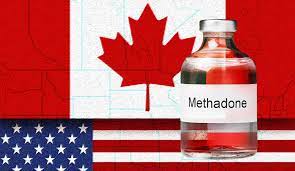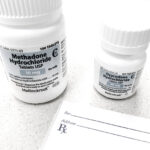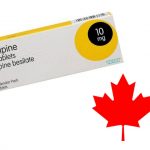Is Methadone Free In Canada?

Methadone is a synthetic opioid agonist used to relieve severe pain in people who are expected to need pain medication around the clock for a long time and who cannot be treated with other medications. It also is used to prevent withdrawal symptoms in patients who were addicted to opiate drugs and are enrolled in treatment programs in order to stop taking or continue not taking the drugs. Methadone is in a class of medications called opiate (narcotic) analgesics. Methadone works to treat pain by changing the way the brain and nervous system respond to pain. It works to treat people who were addicted to opiate drugs by producing similar effects and preventing withdrawal symptoms in people who have stopped using these drugs.
In Canada, methadone is a controlled substance. Previously, Physicians who prescribe methadone require specialized training and an exemption from Health Canada. In addition, each province has its own licensing body which regulates methadone prescription. In Ontario, all methadone maintenance treatment is outpatient-based and follows the College of Physicians and Surgeons of Ontario Methadone Maintenance guidelines.
How is methadone administered in Canada?
Patients in methadone maintenance treatment can fill their methadone prescription at a pharmacy of their choice or receive methadone at the clinic. Methadone must be dispensed by a pharmacist but it can be administered under delegation by a nurse.
How is methadone used?
Methadone comes as a tablet, a dispersible (can be dissolved in liquid) tablet, a solution (liquid), and a concentrated solution to take by mouth. When methadone is used to relieve pain, it may be taken every 8 to 12 hours. If you take methadone as part of a treatment program, your doctor will prescribe the dosing schedule that is best for you. Follow the directions on your prescription label carefully and ask your doctor or pharmacist to explain any part you do not understand. Take methadone exactly as directed.
If you are using the dispersible tablets, do not chew or swallow before mixing the tablet in a liquid. If your doctor has told you to take only part of a tablet, break the tablet carefully along the lines that have been scored into it. Place the tablet or piece of the tablet in at least 120 mL (4 ounces) of water, orange juice, Tang®, citrus flavors of Kool-Aid®, or a citrus fruit drink to dissolve. Drink the entire mixture right away. If some tablet residue remains in the cup after you drink the mixture, add a small amount of liquid to the cup and drink it all.
Your doctor may change your dose of methadone during your treatment. Your doctor may decrease your dose or tell you to take methadone less often as your treatment continues. If you experience pain during your treatment, your doctor may increase your dose or may prescribe an additional medication to control your pain. Talk to your doctor about how you are feeling during your treatment with methadone. Do not take extra doses of methadone or take doses of methadone earlier than they are scheduled even if you experience pain.
Do not stop taking methadone without talking to your doctor. Your doctor will probably want to decrease your dose gradually. If you suddenly stop taking methadone, you may experience withdrawal symptoms such as restlessness, teary eyes, runny nose, yawning, sweating, chills, muscle pain, widened pupils (black circles in the middle of the eyes), irritability, anxiety, backache, joint pain, weakness, stomach cramps, difficulty falling asleep or staying asleep, nausea, decreased appetite, vomiting, or diarrhea.
Is methadone free in Canada?
No, methadone is not free in Canada but the government has removed regulatory constraints that previously prevented easy access to the medication. As of May 19, 2018, exemptions are no longer required from Health Canada for practitioners to prescribe, administer, sell or provide methadone to their patients.
What this means:
For Practitioners
Practitioners can prescribe and administer methadone without obtaining an exemption under subsection 56(1) of the CDSA from Health Canada if:
- the person or animal is a patient under their professional treatment; and
- methadone is required for the condition for which the person or animal is receiving treatment.
For Pharmacists
Pharmacists will no longer need to contact Health Canada in order to verify if a practitioner holds a valid subsection 56(1) exemption to prescribe methadone. Methadone is permitted to be prescribed in the same manner as other narcotics under the NCR. As such, pharmacists may sell or provide a narcotic, such as methadone, to a person if the pharmacist has a written order or prescription, signed and dated, by a practitioner.
Please note that practitioners and pharmacists are still required to meet all other applicable provisions of the Narcotic Control Regulations, as well as the requirements established by their province or territory or the licensing authority (i.e. College of Physician and Surgeons or Nurses, Medical Councils, etc.) governing their practice when dealing with controlled substances. Examples of such requirements include, but are not limited to, additional courses or training.
For Patients
If you require methadone for your treatment, your practitioner can now prescribe and administer methadone to you, as long as you are a patient under their professional care and methadone is required for your condition.
If you are a patient and are considering travelling with methadone, as with any prescribed controlled substance, please see Section 56 Class Exemption For Travellers Who Are Importing or Exporting Prescription Drug Products Containing a Narcotic or a Controlled Drug.
Are there any free methadone clinics in Canada?
Yes, there are several clinics offering free methadone in Canada just like in the US, private non-profit agencies operate the majority of free methadone clinics. Google maps can help you locate the nearest one to you. Reports indicate that thousands of people in Ontario alone get daily doses of methadone, which is often taken in liquid form, from high-volume, for-profit clinics.
A methadone clinic, or substance use disorder services clinic (SUDS), is a clinic which has been established for the dispensing of medications used in the treatment of opiate dependence historically and most commonly methadone, although buprenorphine is also increasingly prescribed.
In Canada one company, Canadian Addiction Treatment Centers (formerly called Ontario Addiction Treatment Centers) owns more than 70 clinics across the province, seeing a total of about 15,000 patients annually.



